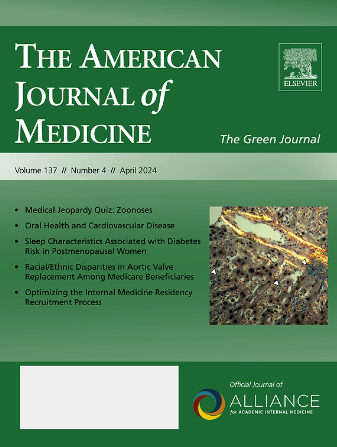工作年龄 COVID-19 幸存者的长期健康相关生活质量:横断面研究
IF 2.5
3区 医学
Q1 MEDICINE, GENERAL & INTERNAL
引用次数: 0
摘要
本文章由计算机程序翻译,如有差异,请以英文原文为准。
Long-Term Health-Related Quality of Life in Working-Age COVID-19 Survivors: A Cross-Sectional Study
Background
Most working-age (18-64) adults have been infected with SARS-CoV-2, and some may have developed post-COVID-19 condition (PCC). However, long-term health-related quality of life (HRQOL) following infection remains uncharacterized.
Methods
In this cross-sectional study, COVID-19 survivors from throughout British Columbia (BC), Canada, completed a questionnaire >2 years after infection. PCC status was self-reported, and HRQOL was assessed using the EuroQol 5-dimension 5-level (EQ-5D-5L) instrument. We compared HRQOL in those with current PCC, those with recovered PCC, and those without a history of PCC. Multivariable analyses were weighted to be representative of COVID-19 survivors in BC.
Results
Of the 1,135 analyzed participants, 19.2% had current PCC, and 27.6% had recovered PCC. Compared to those without a history of PCC, participants with recovered PCC had a similar mean EQ-5D health utility (adjusted difference -0.02 [95%CI -0.03, 0.00]), but those with current PCC had a lower health utility (adjusted difference -0.08 [95%CI -0.12, -0.05]). Participants with current PCC were also more likely to report problems with mobility (adjusted odds ratio (aOR) 6.00 [95%CI 2.88-12.52]), self-care (aOR 5.96 [95%CI 1.84-19.32]), usual activities (aOR 8.00 [95%CI 4.27-14.99]), pain/discomfort (aOR 4.28 [95%CI 2.46-7.48]), and anxiety/depression (aOR 3.45 [95%CI 1.90-6.27]).
Conclusions
In working-age adults who have survived >2 years following COVID-19, HRQOL is high among those who never had PCC or have recovered from PCC. However, individuals with ongoing symptoms have lower HRQOL and are more likely to have functional deficits. These findings underscore the importance of implementing targeted healthcare interventions to improve HRQOL in adults with long-term PCC.
求助全文
通过发布文献求助,成功后即可免费获取论文全文。
去求助
来源期刊

American Journal of Medicine
医学-医学:内科
CiteScore
6.30
自引率
3.40%
发文量
449
审稿时长
9 days
期刊介绍:
The American Journal of Medicine - "The Green Journal" - publishes original clinical research of interest to physicians in internal medicine, both in academia and community-based practice. AJM is the official journal of the Alliance for Academic Internal Medicine, a prestigious group comprising internal medicine department chairs at more than 125 medical schools across the U.S. Each issue carries useful reviews as well as seminal articles of immediate interest to the practicing physician, including peer-reviewed, original scientific studies that have direct clinical significance and position papers on health care issues, medical education, and public policy.
 求助内容:
求助内容: 应助结果提醒方式:
应助结果提醒方式:


